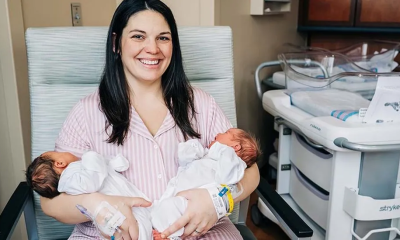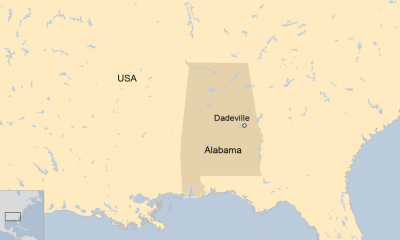Foreign News
Kenneth Eugene Smith faces first nitrogen execution in US after losing last-minute appeals
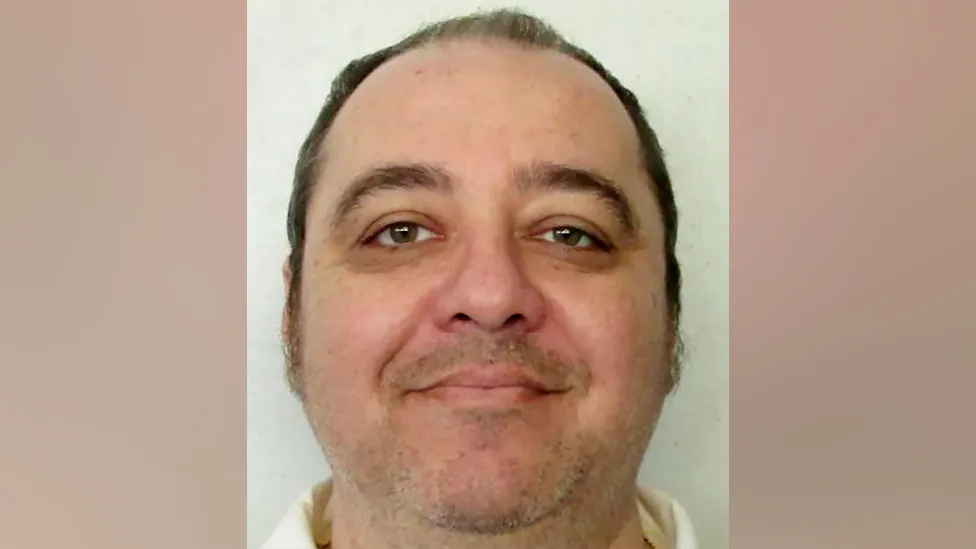
An Alabama death row inmate is expected to become the first person in the US to be executed with nitrogen gas, after losing last-minute appeals.
The US Supreme Court and a lower appeals court declined to block what Kenneth Eugene Smith’s lawyers called a “cruel and unusual” punishment.
Opponents say using nitrogen could cause unnecessary suffering, and a leak could harm people present in the room.
Smith, 58, was convicted in 1989 of murdering Elizabeth Sennett.
Alabama has 30 hours to carry out the execution, which involves pumping nitrogen gas through a mask, from Thursday at 0600 GMT (0100 ET).
He told the BBC earlier this week that the wait felt like torture.
Smith would be the first person to be put to death by this method in the US and, according to the Death Penalty Information Center, anywhere in the world.
Lawyers for the inmate, who has been on death row since 1996, told the BBC on Wednesday night that they were lodging another appeal to the nation’s top court in the hope of a last minute reprieve.
Breathing pure nitrogen without oxygen causes the cells to break down and leads to death. Alabama said in a court filing that they expect him to lose consciousness within seconds and die in a matter of minutes. But its use has been denounced by some medical professionals, who warn it could cause a range of catastrophic mishaps, ranging from violent convulsions to survival in a vegetative state.
Alabama and two other US states have approved the use of nitrogen hypoxia as an alternative method of execution because the drugs used in lethal injections have become more difficult to find, contributing to a fall in the number of executions nationally.
Alabama already tried to execute Smith by lethal injection two years ago but were unable to raise a vein before the state’s death warrant expired.
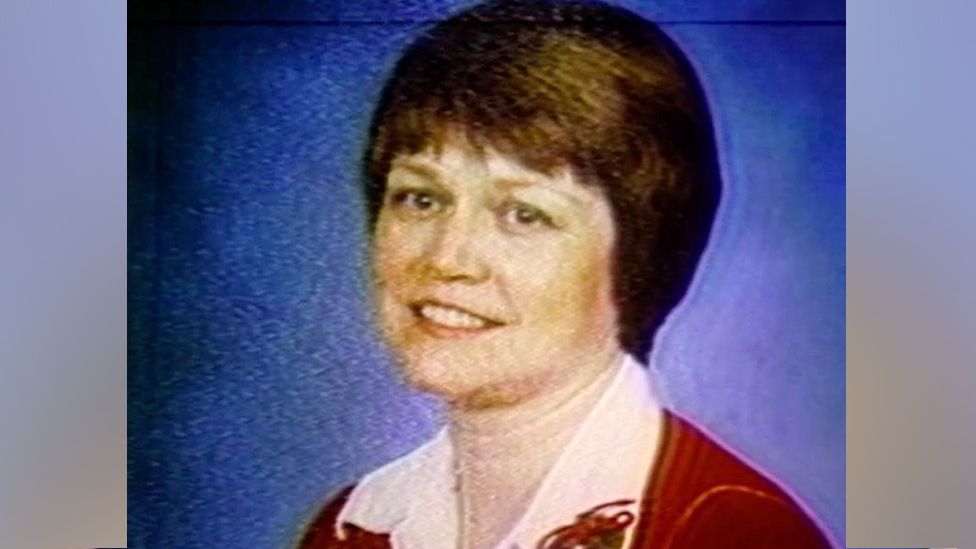
Smith was one of two men convicted of murdering 45-year-old Sennett in a $1,000 (£790) killing-for-hire in March 1988. She was beaten with a fireplace implement and stabbed in the chest and neck, and her death was staged to look like a home invasion and burglary.
Her husband Charles Sennett, a debt-ridden preacher, had orchestrated the scheme to collect insurance money. He killed himself as investigators closed in. Smith’s fellow hitman, John Forrest Parker, was executed in 2010.
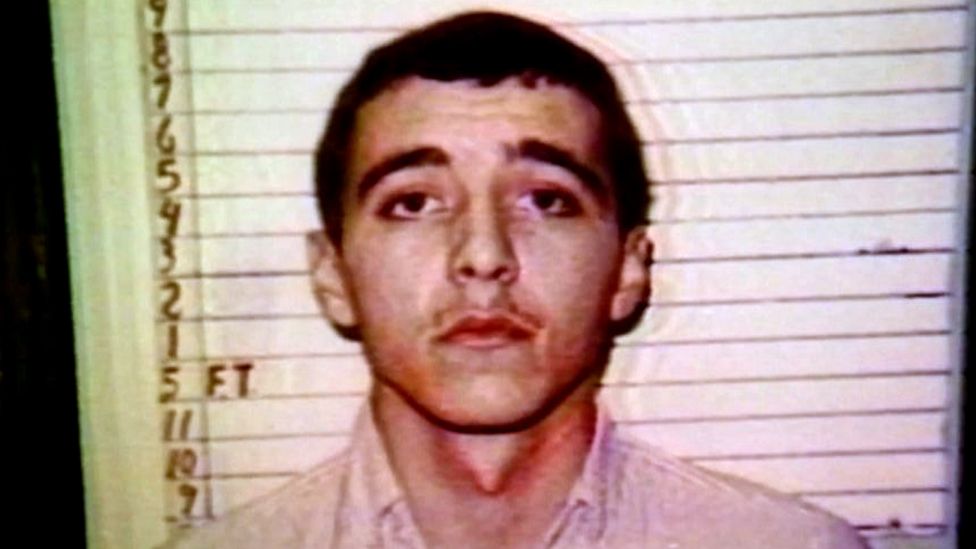
At his trial Smith admitted to being present when the victim was killed, but said he did not take part in the attack.
The UN’s High Commissioner for Human Rights has said gassing Smith could amount to torture or other cruel, inhuman or degrading treatment, and called for a halt. Smith’s lawyers lodged a challenge with the Supreme Court, arguing that putting convicts through multiple execution attempts violates the Eighth Amendment of the US Constitution, which protects against “cruel and unusual” punishment.
On Wednesday, the justices declined to hear the appeal and denied his request to halt the execution. No justice publicly dissented from the ruling.
Smith also made a separate legal challenge to the lower 11th US Circuit Court of Appeals, where he contested the legality of Alabama’s nitrogen gas protocol. But that court also rejected the inmate’s request for an injunction in a ruling on Wednesday evening.
Smith’s lawyers said they would again appeal to the Supreme Court.
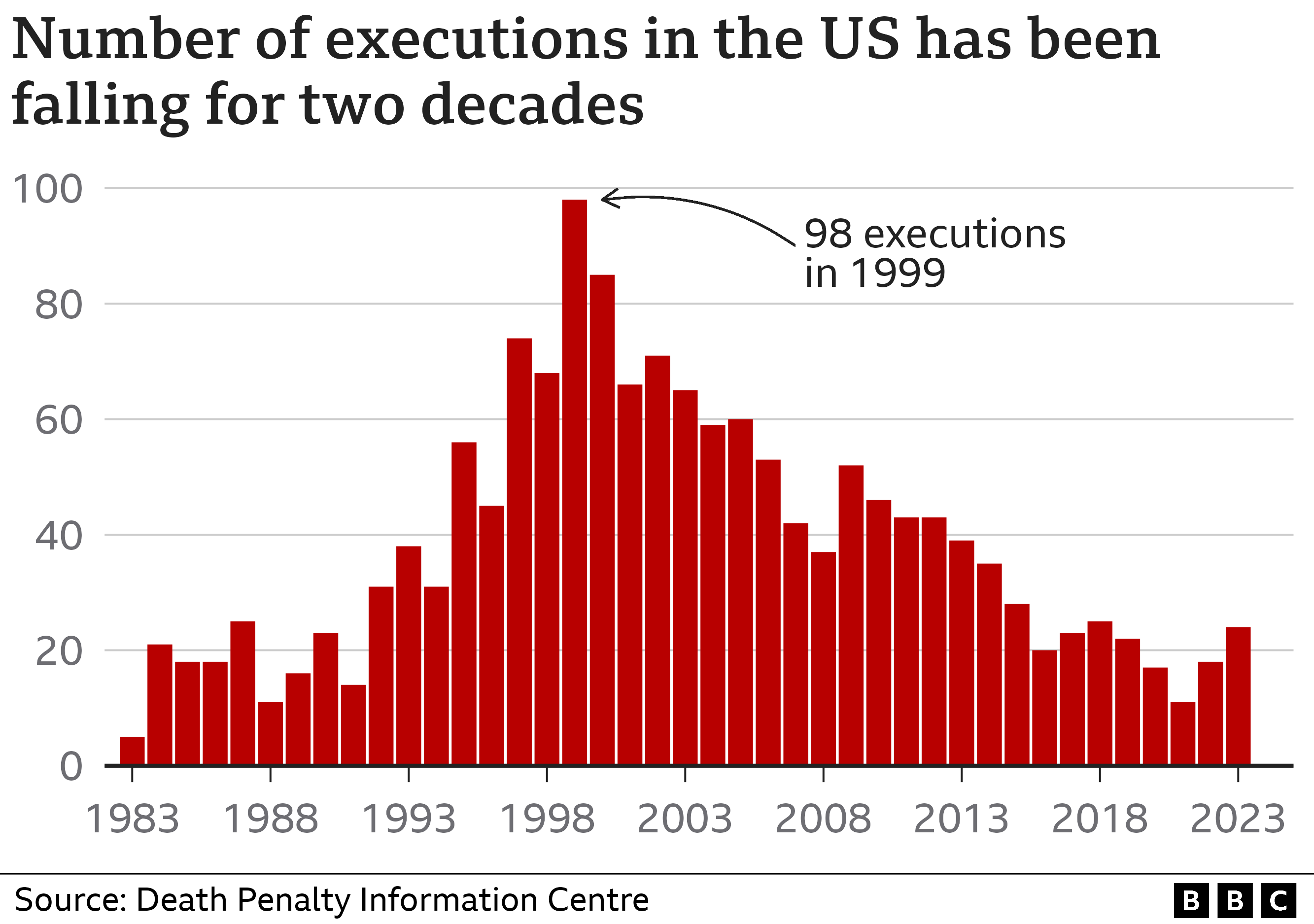
His legal team argue the nitrogen gas method is “recently released and untested”, leaving him at risk of choking on his own vomit.
State Attorney General Steve Marshall previously called it “perhaps the most humane method of execution ever devised”.
Smith’s spiritual adviser, Reverend Jeff Hood, will be present in the room when the execution happens. He told the BBC he believes he will be in danger if the nitrogen leaks.
On Wednesday, prison officials escorted Rev Hood for a “walk-through” of the execution chamber, as required by Alabama’s execution protocol.
He told the BBC afterwards that he saw oxygen-level meters unplugged on a ledge inside the room, which he described as “unbelievably disturbing, it feels like you are at the centre of evil”.
“I asked ‘what’s the safety plan?’ and they said they didn’t want to get into it, they couldn’t get into it,” he said. “Once again we’re back at this place of having to rely on these people who have botched three executions in the last few years, he said. “It’s absolutely a terrifying thing to think that your life hangs in the balance with these guys”.
Rev Hood said he had requested that Alabama’s Governor Kay Ivey be present in the chamber during the execution to demonstrate her confidence in its safety, but had not received a response. “We have somebody who is championing this type of execution in the governor and yet she is unwilling to get her hands dirty,” he said.
The BBC has approached Ms Ivey’s office for comment regarding this and the latest accusations over safety.
Alabama has one of the highest per capita execution rates in the US and has 165 people currently on death row.
Since 2018, the state has been responsible for three botched attempts at lethal injection in which the condemned inmates survived.
The failures led to an internal review that largely placed blame on the prisoners themselves.
(BBC)
Features
Voting for new Pope set to begin with cardinals entering secret conclave

On Wednesday evening, under the domed ceiling of Michelangelo’s Sistine Chapel, 133 cardinals will vote to elect the Catholic Church’s 267th pope.
The day will begin at 10:00 (09:00 BST) with a mass in St Peter’s Basilica. The service, which will be televised, will be presided over by Giovanni Battista Re, the 91-year-old Cardinal Dean who was also the celebrant of Pope Francis’ funeral.
In the early afternoon, mobile signal within the territory of the Vatican will be deactivated to prevent anyone taking part in the conclave from contacting the outside world.
Around 16:15 (15:15 BST), the 133 cardinal electors will gather in the Pauline Chapel and form a procession to the Sistine Chapel.
Once in the Sistine Chapel, one hand resting on a copy of the Gospel, the cardinals will pronounce the prescribed oath of secrecy which precludes them from ever sharing details about how the new Pope was elected.
When the last of the electors has taken the oath, a meditation will be held. Then, the Master of Pontifical Liturgical Celebrations Diego Ravelli will announce “extra omnes” (“everybody out”).
He is one of three ecclesiastical staff allowed to stay in the Sistine Chapel despite not being a cardinal elector, even though they will have to leave the premises during the counting of the votes.
The moment “extra omnes” is pronounced marks the start of the cardinals’ isolation – and the start of the conclave.
The word, which comes from the Latin for “cum clave”, or “locked with key” is slightly misleading, as the cardinals are no longer locked inside; rather, on Tuesday Vatican officials closed the entrances to the Apostolic Palace – which includes the Sistine Chapel- with lead seals which will remain until the end of the proceedings. Swiss guards will also flank all the entrances to the chapel.
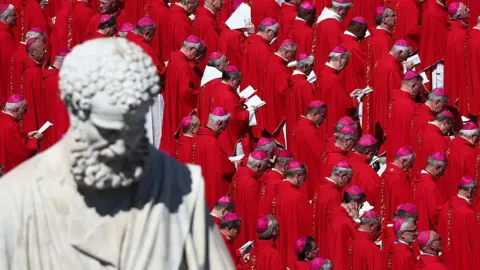
Diego Ravelli will distribute ballot papers, and the cardinals will proceed to the first vote soon after.
While nothing forbids the Pope from being elected with the first vote, it has not happened in centuries. Still, that first ballot is very important, says Austen Ivereigh, a Catholic writer and commentator.
“The cardinals who have more than 20 votes will be taken into consideration. In the first ballot the votes will be very scattered and the electors know they have to concentrate on the ones that have numbers,” says Ivereigh.
He adds that every other ballot thereafter will indicate which of the cardinals have the momentum. “It’s almost like a political campaign… but it’s not really a competition; it’s an effort by the body to find consensus.”
If the vote doesn’t yield the two-third majority needed to elect the new pope, the cardinals go back to guesthouse Casa Santa Marta for dinner. It is then, on the sidelines of the voting process, that important conversations among the cardinals take place and consensus begins to coalesce around different names.
According to Italian media, the menu options consist of light dishes which are usually served to guests of the residence, and includes wine – but no spirits. The waiters and kitchen staff are also sworn to secrecy and cannot leave the grounds for the duration of the conclave.
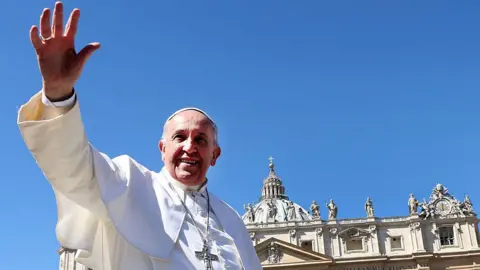
From Thursday morning, cardinals will be taking breakfast between 06:30 (05:30 BST) and 07:30 (06:30 BST) ahead of mass at 08:15 (07:15 BST). Two votes then take place in the morning, followed by lunch and rest. In his memoirs, Pope Francis said that was when he began to receive signals from the other cardinals that serious consensus was beginning to form around him; he was elected during the first afternoon vote. The last two conclaves have all concluded by the end of the second day.
There is no way of knowing at this stage whether this will be a long or a short conclave – but cardinals are aware that dragging the proceedings on could be interpreted as a sign of gaping disagreements.
As they discuss, pray and vote, outside the boarded-up windows of the Sistine Chapel thousands of faithful will be looking up to the chimney to the right of St Peter’s Basilica, waiting for the white plume of smoke to signal that the next pope has been elected.
[BBC]
Foreign News
India launches air strikes on Pakistan and Pakistan-administered Kashmir

The Indian government says it has launched missile strikes on nine sites in Pakistan and Pakistan-administered Kashmir.
Pakistan has confirmed three locations have been hit in what it described as a “cowardly attack”. Foreign Minister Muhammad Ishaq Dar has said eight civilians have died and 35 others have been injured. India has not commented on the toll.
[BBC]
Foreign News
Trump criticised after posting AI image of himself as Pope
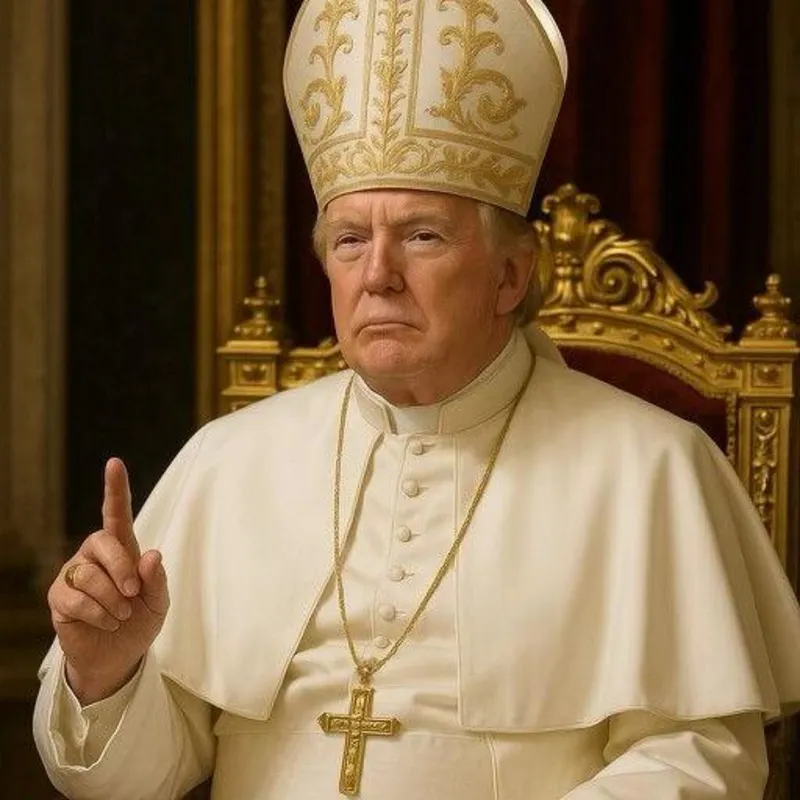
US President Donald Trump has attracted criticism from some Catholics after posting an AI-generated image of himself as the Pope.
The picture, which was shared by official White House social media accounts, comes as Catholics mourn the death of Pope Francis, who died on 21 April, and prepare to choose the next pontiff.
The New York State Catholic Conference accused Trump of mocking the faith. The post comes days after he joked to reporters: “I’d like to be Pope.”
Trump is not the first president to be accused of making a mockery of the Catholic faith. Former US President Joe Biden caused outrage a year ago when he made the sign of the cross at a pro-abortion access rally in Tampa, Florida.
Vatican spokesman Matteo Bruni declined to answer questions about Trump’s post during a briefing with journalists on Saturday. The Vatican is preparing to host a conclave to choose Francis’s successor beginning on Wednesday [07].
The image posted by Trump on Friday night features him wearing a white cassock and pointed miter, traditionally worn by a bishop. He wears a large cross around his neck, and has his finger held up, with a solemn facial expression.
The New York State Catholic Conference, which represents bishops in New York, took to X to criticise the picture. “There is nothing clever or funny about this image, Mr President,” the group wrote. “We just buried our beloved Pope Francis and the cardinals are about to enter a solemn conclave to elect a new successor of St Peter. Do not mock us.”
Left-leaning Italian former Prime Minister Matteo Renzi also blasted Trump’s post. “This is an image that offends believers, insults institutions and shows that the leader of the right-wing world enjoys clowning around,” Renzi wrote in Italian on X.
But the White House rejected any suggestion that the Republican president was making fun of the papacy.
“President Trump flew to Italy to pay his respects to Pope Francis and attend his funeral, and he has been a staunch champion for Catholics and religious liberty,” said press secretary Karoline Leavitt.
[BBC]
-

 News5 days ago
News5 days agoRanil’s Chief Security Officer transferred to KKS
-

 Opinion3 days ago
Opinion3 days agoRemembering Dr. Samuel Mathew: A Heart that Healed Countless Lives
-

 Business1 day ago
Business1 day agoAitken Spence Travels continues its leadership as the only Travelife-Certified DMC in Sri Lanka
-

 Features6 days ago
Features6 days agoThe Broken Promise of the Lankan Cinema: Asoka & Swarna’s Thrilling-Melodrama – Part IV
-
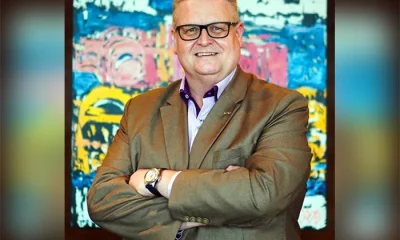
 News6 days ago
News6 days agoRadisson Blu Hotel, Galadari Colombo appoints Marko Janssen as General Manager
-

 Business5 days ago
Business5 days agoCCPI in April 2025 signals a further easing of deflationary conditions
-

 Features6 days ago
Features6 days agoA piece of home at Sri Lankan Musical Night in Dubai
-

 Features5 days ago
Features5 days agoExpensive to die; worship fervour eclipses piety



